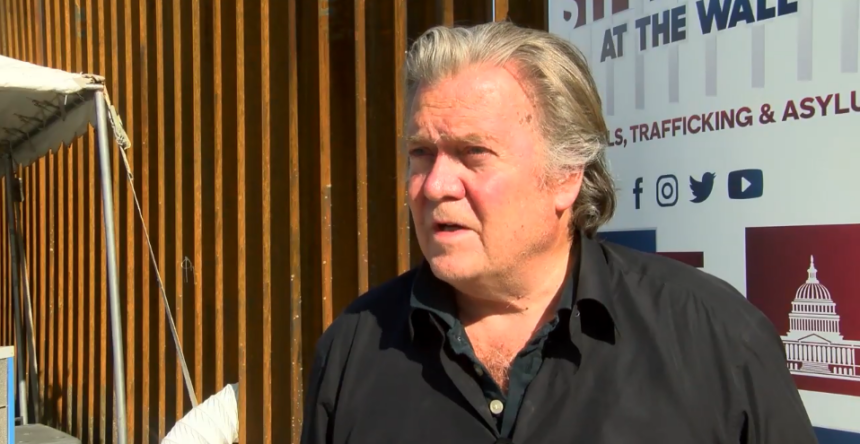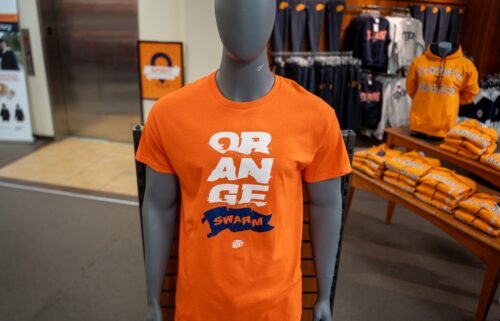Ex-White House adviser Steve Bannon pleads not guilty in fraud scam linked to ‘We Build The Wall’

NEW YORK, NY -- President Donald Trump’s former chief strategist Steve Bannon pleaded not guilty to charges that he ripped off donors to “We Build The Wall” in federal court Thursday, hours after he was pulled from a yacht off the coast of Connecticut and arrested.
The accusations were contained in an indictment unsealed in Manhattan federal court, making Bannon the latest in a long list of Trump allies to be charged with a crime.
At his court hearing on the charges, Bannon had his hands cuffed in front of him while a large, white mask covered most of his face. He rocked back and forward as he sat on a chair in a holding cell, from where he appeared via video as his lawyers were on the telephone.
The magistrate judge approved Bannon’s release on $5 million bail, secured by $1.75 million in assets.
Federal prosecutors allege that Bannon and three others “orchestrated a scheme to defraud hundreds of thousands of donors" in connection with the online crowdfunding campaign that raised more than $25 million to build a wall along the U.S.-Mexico border.
"We Build the Wall" formed in late 2018 from a Go Fund Me account that raised money to erect barriers along the border – including a private wall that was built in 2019 in Sunland Park, New Mexico.
Construction faced resistance from local authorities in New Mexico and drew accusations of improper permitting.
Last summer Bannon, along with other organizers, made their way back to the Borderland to commemorate the completion of the small stretch of border fencing built on private land.
The organizers of the “We Build The Wall" group portrayed themselves as eager to help the president build a “big beautiful” barrier along the border, as he had promised during the 2016 campaign. They did fundraising using their ties to Trump to build legitimacy, and pledged that 100% of the money would be used for the project.
But according to the criminal charges, much of the money never made it to the wall. Instead, it was used to line the pockets of group members, including Bannon, who served in Trump's White House and worked for his campaign. He allegedly took over $1 million, using some to secretly pay co-defendant Brian Kolfage, the founder of the project, and to cover hundreds of thousands of dollars in personal expenses.
The arrests make Bannon the latest addition to a startlingly long list of Trump associates who have been prosecuted, including his former campaign chair, Paul Manafort, his longtime lawyer, Michael Cohen, and his former national security adviser, Michael Flynn. Trump has also made clear that he is willing to use his near-limitless pardon power to help political allies escape legal jeopardy, most recently commuting the sentence of longtime political adviser Roger Stone.
Bannon was taken into custody by the postal inspection service on a 150-foot luxury yacht called Lady May, which was off the coast of Connecticut, authorities said.
Neither Bannon, nor his spokeswoman or attorney responded to requests for comment Thursday. Kolfage did not respond either.
Other prominent members of the group included former Kansas Secretary of State Kris Kobach, its general counsel; Erik Prince, founder of the controversial security firm Blackwater; former Republican Rep. Tom Tancredo of Colorado; and former major league baseball pitcher Curtis Schilling. They were not named in the indictment.
Trump quickly distanced himself from Bannon while claiming he knew nothing about the project and never believed in a privately financed barrier.
“When I read about it, I didn’t like it. I said this is for government, this isn’t for private people. And it sounded to me like showboating,” he told reporters at the White House, adding that he felt “very badly" about the situation.
An immigration plan unveiled by Trump last year included a proposal to allow the public to donate toward his long-promised wall, as the Kolfage group had originally said was its mission before changing it to private construction of their own wall. But Trump later denounced the project publicly, tweeting last month that he “disagreed with doing this very small (tiny) section of wall, in a tricky area, by a private group which raised money by ads” and claiming, “It was only done to make me look bad.”
Attorney General William Barr told The Associated Press he had been made aware of the investigation into Bannon months ago but did not say whether the president had been informed.
According to the indictment, the defendants used fake invoices, another nonprofit and sham vendor arrangements to try to hide their efforts. Under the arrangement, Bannon and his co-defendants allegedly paid Kolfage $100,000 up front and an additional $20,000 monthly, all while claiming they served as volunteers and that Kolfag was not paid.
The indictment said Kolfage “went so far as to send mass emails to his donors asking them to purchase coffee from his unrelated business, telling donors the coffee company was the only way he ‘keeps his family fed and a roof over their head.’”
Kolfage eventually spent some of the over $350,000 he received on home renovations, payments toward a boat, a luxury SUV, a golf cart, jewelry, cosmetic surgery, personal tax payments and credit card debt.
Charges included conspiracy to commit wire fraud and conspiracy to commit money laundering.
Originally called “We the People Build the Wall,” the campaign originally promoted a project for 3 miles of fence posts in south Texas that was ultimately built and largely funded by Fisher Industries, which has received about $2 billion in government funding for wall contracts. The company's CEO, Tommy Fisher, did not respond to calls for comment.
In May, federal officials found that a section of Fisher’s privately funded Texas wall violated flood construction standards along the Rio Grande. It also caused erosion.
Trump recently criticized that section of wall after it showed signs of erosion, saying it was “only done to make me look bad,” even though it was built by his supporters.
Bannon led the conservative Breitbart News before being tapped to serve as chief executive officer of Trump’s campaign in its critical final months. He later served as chief strategist during the turbulent early months of Trump’s administration.
The combative Bannon was a voice of nationalist, outsider conservatism, and he was at the forefront of many of the administration's most contentious policies, including its travel ban on several majority-Muslim countries. But Bannon also clashed with other top advisers and was pushed out.
Bannon, who served in the Navy and worked as an investment banker at Goldman Sachs and as a Hollywood producer before turning to politics, has been hosting a pro-Trump podcast called “War Room” that began during the president’s impeachment proceedings and has continued during the pandemic.
A day before the indictment was unsealed, Kolfage was a featured guest on the show.


